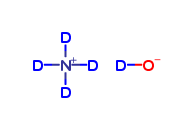Ammoninum D4 Deuteroxide
Find complete chemical information for Ammoninum D4 Deuteroxide. Clearsynth offers high purity Ammoninum D4 Deuteroxide for worldwide delivery
Ammonium D4 Deuteroxide, a compound with unique chemical properties, has found its application across various industries due to its distinctive characteristics. From bulk applications to specific uses involving lists of similar chemical names, Ammonium D4 Deuteroxide plays a crucial role in diverse fields.
Let's Start the Conversation !
Chemical Properties: Ammoninum D4 Deuteroxide
| Product Name | Ammoninum D4 Deuteroxide |
|---|---|
| CAT No. | CS-T-48161 |
| CAS No. | 12168-30-8 |
| Category | Stable Isotopes |
| Stock | Enquire |
| Mol. Wt. | Not Available |
| Mol. For. | Not Available |
| Hazardous | This is not a Hazardous Compound |
| COA | View Sample COA |
| MSDS | View Sample MSDS |
| Industry | Pharmaceuticals |
| Smileys | N.O |
| Canonical Smiles | N.O |
| InchIKey | VHUUQVKOLVNVRT-NSPFYZSMSA-N |
| Inchl | InChI=1S/H3N.H2O/h1H3;1H2/i/hD5 |
| Controlled | No |
| Shipping | Free for purchase above 1000$ |
| Delivery | In-Stock, products will be dispatched within 24 hours via FedEx for USA, Europe, and other countries. |
| Return | Returns/replacement accepted if you are not satisfied with the quality of the product, (please send us an email with the reason/issues which are facing, within 15 days, after receipt of the product). |
| Ordering | Place your order online or by email sales@clearsynth.com |
Ammonium D4 Deuteroxide, also known as Ammonium Hydrogen Deuterium Oxide, is a chemical compound that is commonly used in the field of nuclear magnetic resonance (NMR) spectroscopy. It is a deuterated version of ammonium hydroxide, which means that it contains a heavy isotope of hydrogen called deuterium. The deuterium atom in Ammonium D4 Deuteroxide has one proton and one neutron in its nucleus, whereas the normal hydrogen atom (protium) has only one proton.
The use of Ammonium D4 Deuteroxide is especially important in NMR spectroscopy, as it serves as a solvent for many organic and inorganic compounds that are studied using this technique. This is because the deuterium nucleus has a spin of 1, which allows it to be detected by NMR spectroscopy. Additionally, the use of Ammonium D4 Deuteroxide as a solvent enhances the sensitivity and resolution of the NMR spectra, making it a valuable tool for researchers and scientists.
In terms of its chemical properties, Ammonium D4 Deuteroxide is a colorless liquid with a strong odor, similar to that of ammonia. It is highly soluble in water and has a boiling point of 38.3 °C. It is also a strong base, which means that it can react with acids to form salts and water. Overall, the use of Ammonium D4 Deuteroxide is a crucial aspect of NMR spectroscopy and helps researchers to better understand the properties and behavior of various chemical compounds.
Get an Instant Quote
How is Ammoninum D4 Deuteroxide used ?
Ammoninum D4 Deuteroxide is primarily used in Pharmaceutical Industry and Drug Discovery.
Synonyms
-
• Ammonium Hydroxide (NH4OH)
• Ammonium Chloride (NH4Cl)
• Deuterium Oxide (Heavy Water, D2O)
Related Compounds
Ethylene-d4 Glycol | Acetophenone D5 | Methyl Alcohol D4 | Nitrobenzene D5 | Tert-butanol-d10 | Acetone D6 | Aniline D5 | Diethyl Methyl-d3-malonate | Bromocyclopentane D9 | Benzene-d6 | Benzaldehyde D5 | Methyl-D3 Amine Hydrochloride | Ethanol-OD | Iodomethane-d3 | Bromobenzene D5 | Sodium Deuteroxide solution | tert-Butyl-d9-amine | Tert-butyl Alcohol-OD | Dimethylamine D6 Hydrochloride | Sulfuric Acid D2 | Acetylaniline D5 | Benzene D6 D-Atom 99.5% | Phenol D5 | Formic Acid-d2 | Deuterium Chloride | Phenyl-D5-boronic acid | Trifluoroacetic acid-D | Deuterium Bromide | Isopropanol D7 | Benzoic Acid D5 | Chlorobenzene D5 | Phenethylamine D4 HCl | Acetic Acid D4 | Dibromomethane D2 | tert-Butanol-d9 | Catechol D4 |




